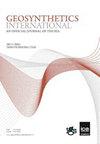Observations on tensile testing of intact and slitted geotextiles through image analysis
IF 3.3
2区 工程技术
Q2 ENGINEERING, GEOLOGICAL
引用次数: 0
Abstract
Geotextiles are widely used as reinforcing elements in many geotechnical engineering applications such as mechanically stabilized earth walls, reinforced soil slopes, capping of high-water content clays in landfills, reinforced embankments for railways and roadways, etc. The ultimate strength of geotextile is obtained from the load-displacement plot; however, the failure mechanism evaluation of local displacement is crucial to understand the serviceability state. In the present study, the image-based deformation measurement technique is used to evaluate the local displacement within geotextile at different locations during the wide-width tensile test. Further, the load-displacement plots are obtained for different geotextiles and a comparison is made between the measured displacements from the instruments and through an image-based deformation measurement technique. Additionally, the strength of geotextiles with imbibed defects at different orientations and corresponding failure patterns is investigated. The imbibed defect in geotextile is in the form of slits having orientations varied as vertical, horizontal, and inclined with respect to the loading direction. It has been observed that geotextile with vertical slit has the highest strength, followed by geotextile with inclined and horizontal slits. The present study results provide insight into the variation in the strength and displacement field of geotextiles having defects.通过图像分析观察完整土工织物和缝合土工织物的拉伸试验
土工织物在许多岩土工程应用中被广泛用作加固元件,如机械加固的土墙、加固的土坡、垃圾填埋场高含水量粘土的覆盖层、铁路和公路的加固路堤等。土工织物的极限强度可从荷载-位移图中获得,但局部位移的失效机理评估对了解其适用性状态至关重要。本研究采用基于图像的变形测量技术来评估宽幅拉伸试验过程中土工织物不同位置的局部位移。此外,还获得了不同土工织物的荷载-位移图,并对仪器测量到的位移和基于图像的变形测量技术测量到的位移进行了比较。此外,还研究了土工织物在不同方向上的嵌入式缺陷的强度以及相应的破坏模式。土工织物中的嵌入式缺陷是以缝隙的形式存在的,其方向相对于加载方向有垂直、水平和倾斜之分。据观察,带有垂直缝隙的土工织物强度最高,其次是带有倾斜缝隙和水平缝隙的土工织物。本研究结果有助于深入了解有缺陷的土工织物在强度和位移场方面的变化。
本文章由计算机程序翻译,如有差异,请以英文原文为准。
求助全文
约1分钟内获得全文
求助全文
来源期刊

Geosynthetics International
ENGINEERING, GEOLOGICAL-GEOSCIENCES, MULTIDISCIPLINARY
CiteScore
6.90
自引率
20.00%
发文量
91
审稿时长
>12 weeks
期刊介绍:
An online only, rapid publication journal, Geosynthetics International – an official journal of the International Geosynthetics Society (IGS) – publishes the best information on current geosynthetics technology in research, design innovation, new materials and construction practice.
Topics covered
The whole of geosynthetic materials (including natural fibre products) such as research, behaviour, performance analysis, testing, design, construction methods, case histories and field experience. Geosynthetics International is received by all members of the IGS as part of their membership, and is published in e-only format six times a year.
 求助内容:
求助内容: 应助结果提醒方式:
应助结果提醒方式:


